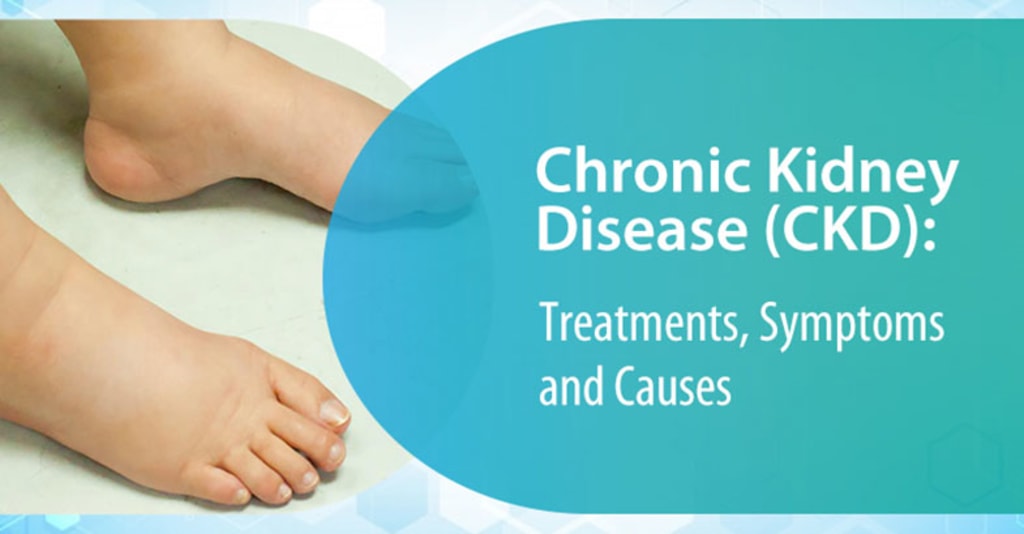The Common Symptoms of Chronic Kidney Disease and Why You Should Know Them
Common Symptoms of Chronic Kidney Disease

Kidneys are organs that are responsible for helping the body get rid of toxins and waste material by filtering the body fluids and regulating blood pressure. There are several conditions that hamper this functioning. A common one of these conditions is Chronic Kidney Disease, Chronic Renal Disease or Kidney Failure. The condition which involves a loss of kidney function can lead to dangerous levels of the buildup of fluids, electrolytes and toxins in the body.
Chronic Kidney Disease is a progressive disease. It involves the loss of kidney function, which can only be kept in check by focusing on and monitoring the symptoms. This is why knowing Chronic Kidney Disease Symptoms can help you identify the disease in its initial stages and seek proper healthcare before excessive damage has occurred.
Causes and risk factors
The loss of kidney function may be a result of several factors. These include- diabetes, high blood pressure, polycystic kidney disease or cardiovascular diseases. There are a few risk factors that can increase the chance of developing CKD, such as smoking, alcohol consumption, obesity and old age.
People with a family history of kidney failure or an abnormal kidney structure showing any Chronic Kidney Disease Symptoms should immediately contact a healthcare professional to find out if there is any sudden impairment in kidney function.
Stages
The functioning of the kidney is measured as GFR or Glomerular Filtration Rate. The stages of CKD can be found out by measuring the GFR. There are five stages of this disease, which have varying levels of GFR.
Stage 1 — Normal (Level) →90 mL/min
Stage 2 — Mild CKD (Level) →90 mL/min
Stage 3A — Moderate CKD (Level) →90 mL/min
Stage 3B — Progressing CKD (Level) →90 mL/min
Stage 4 — Severe CKD (Level) →90 mL/min
Stage 5 — End-stage of CKD (Level) →90 mL/min
The GFR is tested if the patient shows symptoms associated with CKD. It can help in confirming the presence of the disease.
Symptoms of Chronic Kidney Disease
Since the condition is a gradual loss of kidney function, the symptoms of the disease are not visible until the later stages when the kidney is impaired significantly. Knowing and identifying Chronic Kidney Disease Symptoms can prove to be life-saving. The kidney may have altered functioning due to various types of diseases. Only with proper diagnostic tests can it be determined if the patient is suffering from Chronic Kidney Disease.
Some of the most common symptoms that are visible in patients with progressing kidney disease are:
- Feeling tired all the time
- Feeling cold even if it is warm around
- Having difficulty in breathing
- Feeling dizzy or fainting
- Having trouble focusing or thinking clearly
- Severe skin itching
- Fluid buildup in legs, ankle, feet or hands
- Facial swelling
- Loss of taste or appetite
- Bad breath
- Nausea
- Urinating more often or having trouble urinating
- Foamy urine
- Excessive and sudden weight loss
- Blood in urine
- Insomnia or difficulty in sleeping
- Muscle twitching and cramps
- Erectile dysfunction in men
- High blood pressure
- Chest pain
- Loss of immune function
- Anaemia
A patient with faltering kidneys may have a few or most of these symptoms. A lot of these symptoms are nonspecific, which means that they may also be indicators of other diseases. This is why it is essential to seek medical help in case you experience any CKD Symptoms to determine the course of the treatment.
Diagnosis and treatment
In the presence of one or more CKD Symptoms, it is important to seek immediate medical care. The diagnosis is made through monitoring the blood pressure of the patient and performing blood and urine tests. If diagnosed at an early stage, the condition can be prevented from advancing with the help of proper medical treatment.
The treatment is focused on the underlying cause to slow the progression of the disease. The advancement of kidney failure can be controlled if the disease is identified in the earlier stages. If left untreated, the disease can have severe complications, and the person would require dialysis or a kidney transplant.
Complications associated with the disease:
The accumulation of toxic substances due to CKD can be life-threatening. Seeking proper medical care is thus essential to fight against this disease. In case the treatment is not provided on time, the following complications may arise:
● Excessive fluid retention in the body
● Cardiovascular diseases
● Weakening of the bones
● Loss of body’s ability to fight against infections
In case of end-stage kidney failure, transplantation from a donor has to be performed.
Since the diagnosis and further treatment is dependent on the CKD Symptoms, it is important to be aware of them. As soon as you come across any of the symptoms associated with CKD, it is important to undergo diagnostic tests to find the root cause and the current stage of the disease.
Source - Medium
About the Creator
Vishal Kumar
Hey I am Vishal Kumar from Delhi, India.






Comments
There are no comments for this story
Be the first to respond and start the conversation.